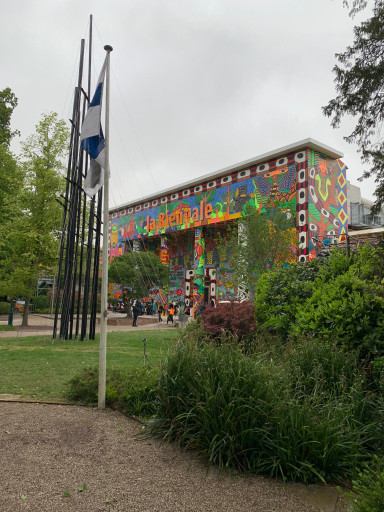

Stefan Kobel
,
Kobel's Art Weekly 17 2024
Art market reporting in the narrower sense was sparse last week because the arts media worldwide focused on the Biennale di Venezia, which is officially a non-market event and yet is considered the largest art fair in the world. Here, not in Kassel, it feels like there is a gallery representative next to every exhibit and here, not in Miami, the most sophisticated dinners and parties are celebrated. It is therefore only logical to assume that the next trend that will find its way into galleries, museums and auction houses will be indigenous art, which is currently being showcased in Venice. It seems just as logical that the two Golden Lions will not go to "traditional" Indigenous Australian art for example with its abstract-ornamental narratives that can hardly be put into words, but to positions that formally have long since established themselves in the global (usually read as Western) art discourse. Please decolonise yourselves and us according to the rules that we and the market set!
The art market needs to dress warmly - the luxury sector has cooled off. According to dpa, LVMH is disappointing analysts: "LVMH suffered losses particularly in the alcoholic beverages business such as Hennessy Cognac. But even the largest division with fashion and leather goods such as Louis Vuitton handbags only achieved a plus of two per cent on a comparable basis. In the jewellery division with the Tiffany brand, revenue fell organically by two per cent. Thanks to strong demand for fashion, jewellery and perfume, 2023 was still the best year in the Group's history."
More company transfer than takeover: Munich and Krefeld are moving closer together, reports Sabine Spindler in Handelsblatt: "Together with Jürgen Schops, Turowski took over the auction house Herr in Cologne in 2009. They did not resist the takeover offer from Danish auction house Lauritz in 2014. After a lock-up period of three years, they made a fresh start in Krefeld. For Quittenbaum, the merger not only means pooling its strengths. It will also enable Germany's leading design auctioneer to increase its financial volume."
Galerie Johann König is moving to Munich, reports Sabine Spindler in the Handelsblatt: "From a commercial point of view, he appreciates Munich as a city with a financially strong collector base and a sense of culture. Munich is also a stable business location thanks to the arrival of companies such as Google, Apple and US tech giant Meta. The Bergson now offers the opportunity to operate here in the longer term: 'We expect to be here for several years. A sculpture garden is also planned. Even though the strategic motto of successful galleries today is the internationalisation of locations, König does not see the move to Munich as a retreat from the international stage: 'We operate globally, but our strongest market is in Germany. The gallery in Tokyo, for example, was given up because he was unable to gain access to the local community, says König."
A US museum has recently started earning some extra money as a guarantor for auction houses, reports Katya Kazakina at Artnet: "In what appears to be an unprecedented move, the Toledo Museum of Art in Ohio has started providing guarantees for artworks that it wants to acquire at auction. Such deals generated about $500,000 for the institution this year, when it was outbid on two artworks at Sotheby's, according to its director, Adam Levine [...] 'It allows us to use an existing mechanism for artworks we have a legit strategic interest in,' Levine said in an interview. 'We have a clear collecting strategy. We know what we want. But auction is an environment in which it's exceedingly difficult for museums to be competitive. We have scarce resources. If we don't get the artwork, we should feel disappointed. At least we get compensated.'"
This happened even faster than with Anna Sorokin or Wolfgang Fischer. The case of fraudster Inigo Philbrick is to be made into a TV series immediately after his release, reports Jake Kanter at Deadline: "HBO is teaming up with Doctor Who producer Bad Wolf to develop a series about Inigo Philbrick, the flamboyant art dealer jailed for committing more than $86 million in fraud. Bad Wolf has secured the rights to All That Glitters, an upcoming memoir from Orlando Whitfield, who was a close friend and business partner of Philbrick." It is probably enough to have read Charlotte Edwards' article about the book in the Guardian.
semi-automatically translated